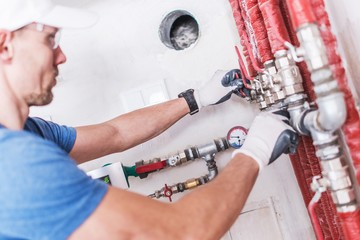Whether you’re looking to get into the field or just considering a career change, there are several advantages to becoming a plumber. You’ll have the opportunity to earn a high income, work with a wide variety of people and enjoy an exciting career that can be customized to your lifestyle.

Plumbers are responsible for installing, maintaining, and repairing sewers, drains, and potable water systems. They are also responsible for diagnosing and troubleshooting malfunctioning plumbing components. You may also work with specialized equipment, such as pressure gauges. Plumbing apprenticeships typically require a high school diploma or GED. You’ll also need a clean background, a valid driver’s license, and reliable transportation.
Whether you’re looking to find a job in the plumbing industry or you want to earn money as a professional, apprenticeships are the way to go. These programs combine classroom instruction and on-the-job training to help you master the skills you need to succeed.
You’ll learn everything from reading blueprints to using specialized equipment to performing maintenance on the plumbing system. You may even take classes on computer programs. Plumbing apprenticeships generally take between two and five years to complete. Plumbing apprenticeships can be customized to meet your schedule and your needs. In some cases, you can complete a certificate of qualification in two years. You’ll also receive periodic wage increases as you meet program requirements.
Getting certifications for plumbers is a good way to demonstrate expertise in the plumbing industry. However, not all certifications are equal. Some employers prefer candidates who have gotten certifications.
The appropriate state government agency issues certifications for plumbers. Plumbers must complete a training program and pass an exam. The state then licenses them. Depending on the state, the license may require continuing education and on-the-job experience.
Plumbers install pipes and fixtures in residential and commercial buildings. They also repair water and electrical systems. Some plumbers specialize in commercial or industrial work. Some plumbers are members of a labor union, which negotiates wages. Plumbing can be an exciting career. However, it can be a dangerous profession. Plumbers often work in cramped spaces and are exposed to varying weather conditions. Plumbers also need to lift and carry heavy pipes. They need to be comfortable working outdoors or in indoor environments. They also need to be able to analyze information to determine the source of a problem.
Many factors determine how much you will make. Depending on your location, skills, and experience, the average salary for plumbers can range from around $42,000 to $90,000. It is also important to consider the cost of living in the state where you will work. Regardless of your location, the average salary for plumbers is a good sign of the job’s popularity. However, to make the most money, you need to get licensed. The best way to find out what the average salary for plumbers is is to compare it to the national median. This will help you see what is going on in your local area.
Various plumbing jobs require different skills. Plumbers are responsible for installing and repairing pipes, water and waste management systems, and fixtures. Some jobs involve working in homes, commercial buildings, or industrial facilities. Plumbers also respond to backed-up drain lines, emergencies, and unexpected flooding. They are often on call at all hours of the day and night.
Plumbers may specialize in one of several types of work. For example, there are construction plumbers who work to design and install plumbing systems for new homes and buildings. Some sanitary plumbers deal with drain and sewage systems. They install pipes, repair clogged drains, and perform other plumbing activities.
There are also specialized plumbers, known as pipelayers, who are responsible for digging trenches and ensuring that pipes are secure. These plumbers may also work on gas and oil lines. These plumbers must be able to read blueprints and calculate water pressure. They also must have a strong grasp of math.